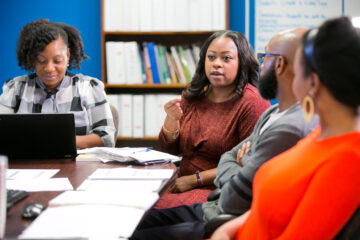Cross-posted from Education Week
They’re at it again in New York City. When Mayor Bloomberg came in, his education chancellor, Joel Klein, blessed Balanced Literacy—the program backed by Columbia University scholar Lucy Calkins, not the general philosophy of reading by the same name—as the official reading strategy of the New York system. But then a study claimed to show that it was not working as well as advertised, so Balanced Literacy was un-endorsed. But now it is back, re-endorsed by the new Chancellor, Carmen Farina. Which has led to much indignation.
The first piece I saw on this was by University of Virginia Professor of Psychology Daniel Willingham, who chided the Chancellor for dumping a program—the Core Knowledge reading program—that research had shown was more than twice as effective as the one the Chancellor had reinstated. Checker Finn, president of the Thomas B. Fordham Institute, then piled on by pronouncing Balanced Literacy a hoax, a wolf (that would be Whole Language) in sheep’s clothing (that would be Balanced Literacy). But Finn urges his readers to be aware that Lucy Calkins will not be easy to defeat, as she is “resourceful, smart and tireless.” Finn wishes that New York City would acknowledge the superior wisdom of reading expert Louisa Moats on this matter, Moats having demolished Whole Language to his satisfaction in two “exemplary works.”
Nothing here that the aficionados of the reading wars have not heard again and again, but allow me to translate for a moment, for those not so engaged. Moats, Finn and others in their corner insist that one cannot learn to read without being able to decode the works on the written page with fluency and it is therefore the first obligation of teachers to devote themselves first to phonemic awareness and then straight ahead phonics instruction—no fooling around, no indirection, no endless warm-ups, just go for it.
E.D. Hirsch, founder of the Core Knowledge Foundation, makes the reasonable point that words are not just collections of phonemes; they actually signify something and students will read better if they can connect the words to the things in the real world that they signify, which requires knowledge, not just skills. So the program offered by the Core Knowledge Foundation connects mastery of phonics with a deliberate effort to build students’ factual knowledge and the vocabulary that comes with widening knowledge of the world.
Lucy Calkins and others affiliated with her acknowledge the importance of phonemic fluency but they think that students will be more inclined to make the considerable effort that is required to learn to read if their teacher engages them in reading material that they are interested in, even if, at the start, that material is not quite as demanding as it should be as measured by their chronological age, and they think this especially true if the student comes from a low-income family with limited knowledge of the larger world and few, if any books at home. To get to such kids, and many others who might be hard to reach, they want to draw on a fairly eclectic variety of techniques that researchers and teachers have evolved over the years.
No doubt the defenders of each of these approaches are beside themselves with these characterizations of each of these approaches, for I have grossly oversimplified the positions of each of these people, all of whom offer, in my judgment, something very important.
But bear with me for a moment. I am not about to take sides in this debate, but rather to use it to make a point.
Willingham and Finn are upset because Chancellor Farina has rejected an approach to reading instruction that research has proven to be two and one half times as effective as the one she chose. But Chancellor Farina is a highly experienced, tough, knowledgeable educator—a very effective former principal—who is devoted to the children of New York City. No one has charged her with having a nefarious motive. So why would she do such a thing?
I have no inside knowledge concerning the answer to that question, but I can hazard a guess: Because she has seen what Balanced Literacy did in her own school and other schools of which she has intimate knowledge and therefore knows how effective it can be in the hands of highly competent teachers with good leadership.
I have italicized the most important words in the last sentence, because they are the key to the argument I want to make. It is not hard to systematize phonics instruction. Nor is it hard to systematize the essence of the Core Knowledge approach to knowledge development. But Balanced Literacy is more like a movement than a highly specified teaching program that leaves little to the teacher’s imagination or discretion. Indeed, balanced literacy, as an approach, is far more appealing to teachers likely to march to their own drummer than the typical hard-edged phonics program or the Core Knowledge approach. The result is that, even with Lucy Calkins’ version of balanced literacy, there is likely to be far more variation in the instruction actually experienced by individual children than in either of the other two programs.
To this I would add the very large variation we see in the educational background, literacy and general ability of classroom teachers all over the United States. And this is the crux of the matter. Given this variety, we should expect that, on balance, we would get better results from almost any highly specified approach to the solution of any instructional challenge, including reading instruction, than from approaches that are not highly specified. We should expect that deeply educated, highly trained teachers who have spent time perfecting their craft would take advantage of the range and flexibility provided by the Balanced Literacy program to take advantage of a range of well-researched reading programs to build reading programs for their students that are tailored to the needs of each student and highly effective. I am willing to bet that this is what appeals to Chancellor Farina about the Balanced Literacy program devised by Lucy Calkins.
But, at the same time, that same flexibility can lead to very poor results in the hands of a teacher who comes from the bottom of her high school class, went to a second rate college, attended a lousy school of education and is getting very poor leadership in her school. That teacher would actually benefit from the higher specificity and relative lack of flexibility of the other programs briefly described here. My guess is that Chancellor Farina understands that the research results cited by Willingham and Finn may tell us more about the range of capacity of teachers and of the nature of the leadership they get than it does about the effectiveness of the programs it purports to tell us about.
To my way of thinking, the most important issue here is not which reading program is most effective. It is whether we design highly specified programs in the belief that most teachers do not have the skill and knowledge to use a wide range of available research to craft highly effective programs matched to the needs of the specific kids in their classroom, or decide instead to attract, educate and train a teacher workforce of true professionals who do not have to be scripted that way, indeed who can be trusted to produce superior results when they are not so constrained.





